Dear Barbara,
The Italians pull their masks under the chin. The old bus rolls under the burning sun of Donoussa, and everybody is searching for a flower among the dry bushes as if this will be proof that the summer is still alive. Throughout the route, though, there are only rough smells, outworn asphalt, and scattered people against the waves. This small Babylon of vacationers moves around and listens to the wind that blows from the depth of the Aegean Sea. It’s not a song, and it’s not a tune; it’s just the vowels of Donoussa that sigh while climbing the cliffs.
I stare at the drywalls. The large stones found, the small ones construct. The mortars are absent -and whatever connects us this summer is missing as well. Social distancing, which is thought to be the only medicine, has dozens of side effects. The narrative gave its place to statistics, the ancient sense of proportion was surrounded by restrictions, and mass media dictated reality. Our lives, always fragmentary and deserted, have lost their freshness, and they resemble the slopes of this island: arid and dry, they await impatiently the northern winds that’ll bring them back to life.
Self-luminous at the stage of Donoussa
For lonesome travelers, the charm of remote islands is not just a matter of landscape. The raw land exempted from town planning, the delay in investments, and the ferries that can’t reach them when the sea becomes rough are all elements that keep those islands underpopulated. The attraction for remote places is weaved together with local struggles. One daydreams about the simplicity of life for ten days, disregarding the problems of the natives all year long.
At Stavros, the main settlement of Donoussa, every restaurant overlooks the sea. Every summer, this is a privilege that gains importance: exhausted by the cement, the visitors search thirstily for the horizon. The human geography pulsates like the small vessels at the port. Soon, the glance focuses on the crowd. Thoughtless consumption takes place beneath the labels of bars and restaurants as if that’s the only postcard of the summer. However, the authentic image of life unfolds down at the waterfront.
That’s the gathering point of the unripened teenagers. They make their first appearance in the life of summer, like a brand new ecosystem. Boys and girls present themselves self-luminously for the first time at the stage of Donoussa. They have never felt so lively before: they breathe only by their first names. Their surnames are just a misfortune they will rediscover much later in life. This year though, they will communicate, they will discover, and they’ll get hurt. These boys and girls will cross the beach of Stavros, running carelessly on the sand, and they’ll change their beliefs faster than the flight of seagulls.
For several summers in a row, there won’t be any battle between good and evil; there’ll only be an undiscovered territory. Lust, expectations, and some grains of guilt. They won’t realize that innocence is over before they stand in front of a bank counter, at a tax office queue, or in the cage of a public service bureau. Then they’ll meet again with their surnames, and they’ll start living beneath signs and labels.
Donoussa and the art of making pompous statements
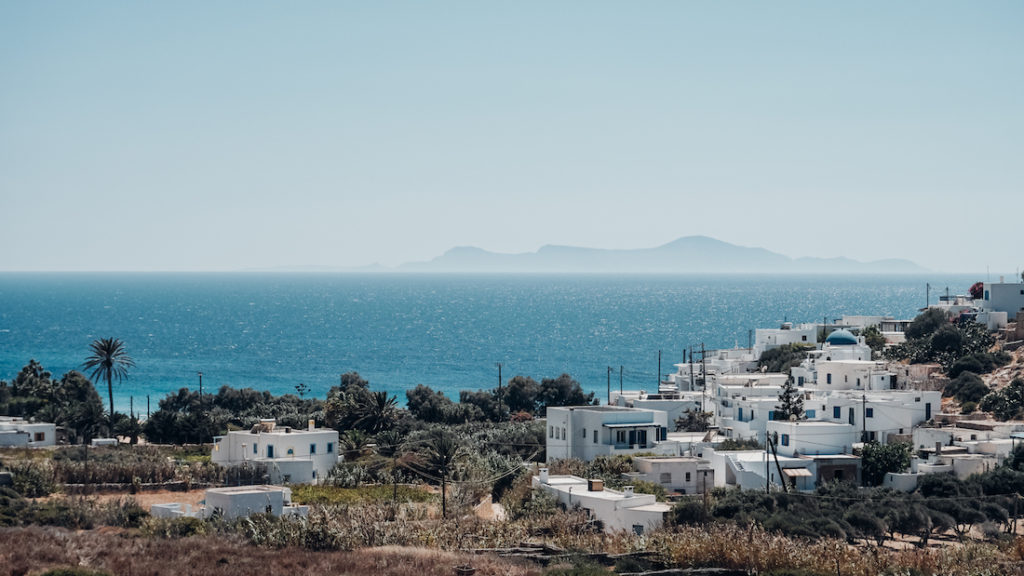
The talks you overhear are always an organic part of a journey. Even though they can’t sculpt the landscape, they betray something about the place. Donoussa seems sententious. Verbal fireworks rise into the sky: sometimes they touch the sun while others take place among the stars. One can overhear phrases like “The veal has great value,” or “Three out of thirty I’m going to issue,” or even “The Greeks are always in cahoots with each other.”
It’s not so easy to decipher these statements. It can very well be that they don’t mean anything at all. But for sure, the strong wind affects their tonality. And then, all these statements become an exercise of orthophony. One should keep his voice steady if he wants to be heard in Donoussa. The island constantly vibrates due to the wind -that’s where its name comes from- and one can only find refuge at the seashore. The sea is quiet, almost yawning, and shallows the pompous words like white pebbles.
But one evening, I realize that Donoussa has gotten under my skin. I have just climbed the rutty path from Livadi Beach to Mersini, and I stare at the small graveyard on the slope. A handful of graves surrounded by whitewash and stones. It is a death with a view. But the white crosses face the mainland, and this makes me wonder with a statement: “Why did they have to bury them with their back to the sea, though?”
Of sand and towels
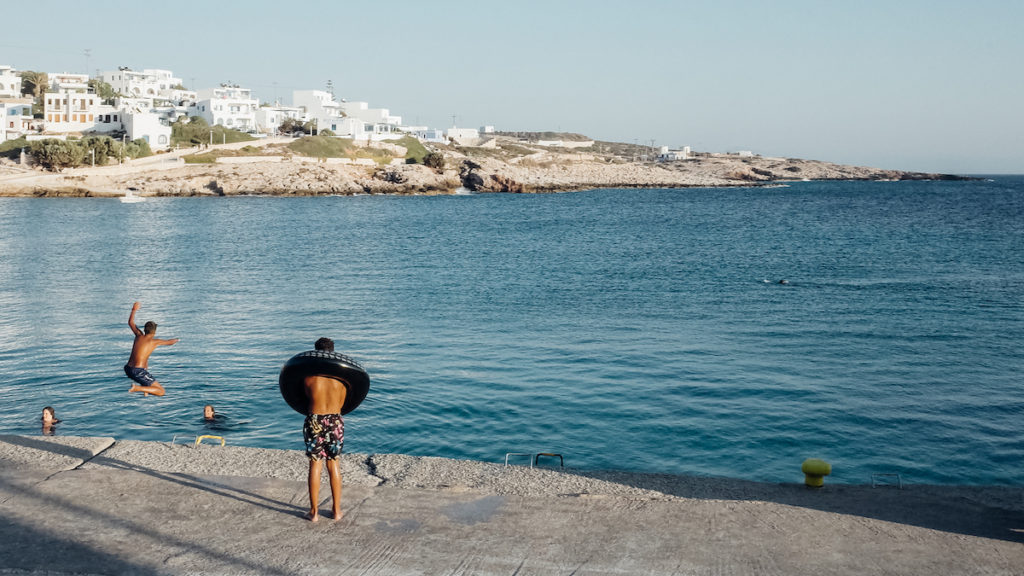
The Italians raise their beach towels against the waves. After packing their stuff, they lift the towels and let them swirl. It’s not something they do rigorously: they hold them above their heads, and the wind decides to clean them. They stay like this for fifteen seconds, like human flags, and stare secretly at Donoussa beneath the fabric. On the other hand, the Greeks, who all winter long were haunted by the morbid trucks of Bergamo, are more pedantic. They clean the towels carefully by moving their palms up and down like clumsy guitarists until the last grain of sand vanishes.
It’s the eleventh consecutive summer I wear the same shoes. Every September, I think this is their last year: they are outworn, don’t fit properly anymore, and I’m afraid winter will destroy them. But every summer, they prove they can still walk a couple of thousand steps more. From Anafi to Sikinos and from Schinoussa to Crete, the accumulated sand of the islands is probably preventing decomposition.
Maybe the Italians know better: the memory of sand oxygenates the summer.
The view of Amorgos from Mersini, Donoussa
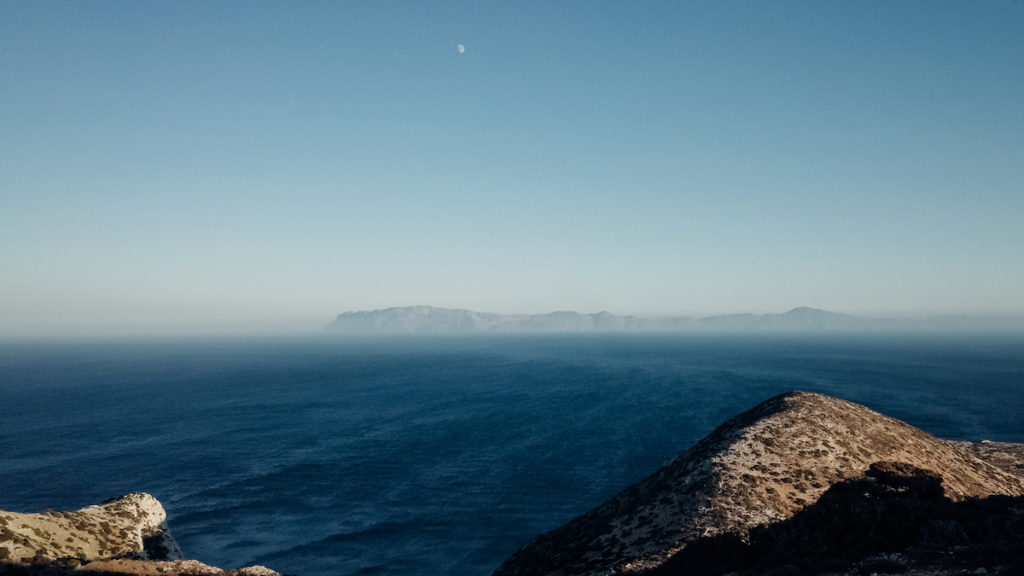
One should see Amorgos from the church of Agia Sofia in Mersini. Every time I climb the path from Livadi, the wind is aggressive. There’s no place to stand while waiting for the bus back to Stavros. All I can do is shelter myself in the yard of the little church and sit on the bench that overlooks the sea.
It’s an oblong yard, and the white wall on the right side has a blue finish that seems flammable, like a matchhead. Across the sea, Amorgos looks transparent due to the orange light of the afternoon. Fluffy clouds stand on top of this rock in the middle of the open sea, and above it, long before sunset, the moon becomes an allusion to the landscape: it resembles a pebble that decided to travel.
At a quarter past seven, the bus horns like a boat ready to depart. There’s no other way to perceive its arrival. The heads waiting in the yard of Agia Sofia walk a couple of meters against the wind. We all embark. Grey rocks, scattered goats, and a bus panting on the curves at twenty kilometers per hour.
A taverna in the middle of nowhere
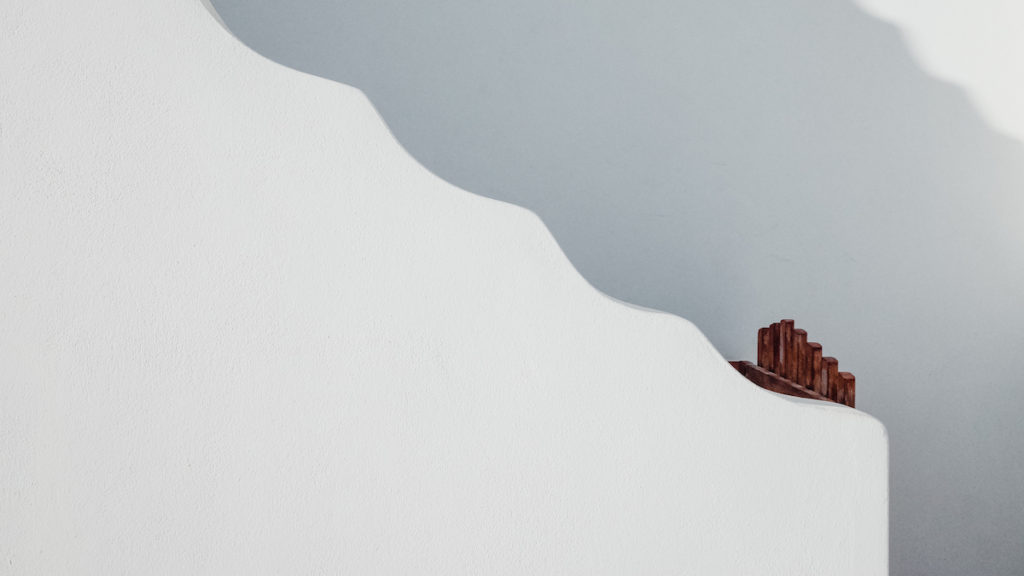
On deserted landscapes, I often remember Wim Wenders and “The Salt of the Earth.” One night, at the taverna of Mitsos in Kalotaritissa, I stray while trying to call the only taxi on the island. Without noticing it, I’m already a hundred meters away, and I’m standing in front of the dark sea. A lonely tree demarcates the end of the shore. There’s only a shiny speck when I look back: the taverna.
Some people dance in front of a fire on the other side of the shore. I can only hear diffused laughter. I check alternately the two shiny dots: the fire and the taverna. I’m in the middle of the Aegean Sea, in the middle of the night, and on the shore’s edge. I could potentially choose between the two shiny dots, the more hospitable one, but being so decisive in the middle of nowhere seems unbearable.
Trypiti Beach, Donoussa

At Trypiti, the Italians are born in the sea. On one of the last days of August, when I reach the beach, I only see two people. It’s a couple of days now that I keep listening, “Tonight, the island will be empty.” But this never happens. This day though, the statement seems to be valid. For a couple of minutes, the beach of Trypiti is quiet.
Twenty minutes later, I see people swimming towards the shore, others appear suddenly behind the rocks, and another bunch walks down the path. It’s a proper invasion, an almost deliberate one, and soon two dozens of towels lay on the beach. I can count approximately twenty heads, from nine-year-old kids to eighteen-year-old teenagers -and I also see five adults. It’s like one more feast of Italian neorealism, where the whole cast arrives at the beach, but no one knows why.
The beach is vibrant now. The Italians snuggle, push each other playfully, swim naked, run non-stop on the blond sand. Later the same evening, I see them at Kyma, a waterside taverna at Stavros. They drink and laugh, and the Greek clients say, “Let’s go to the other side; there are Italians making noise here.”
The summer of 2020, its depressing spirit, and one thousand contradictions simmering next to the sea.

Save the summer
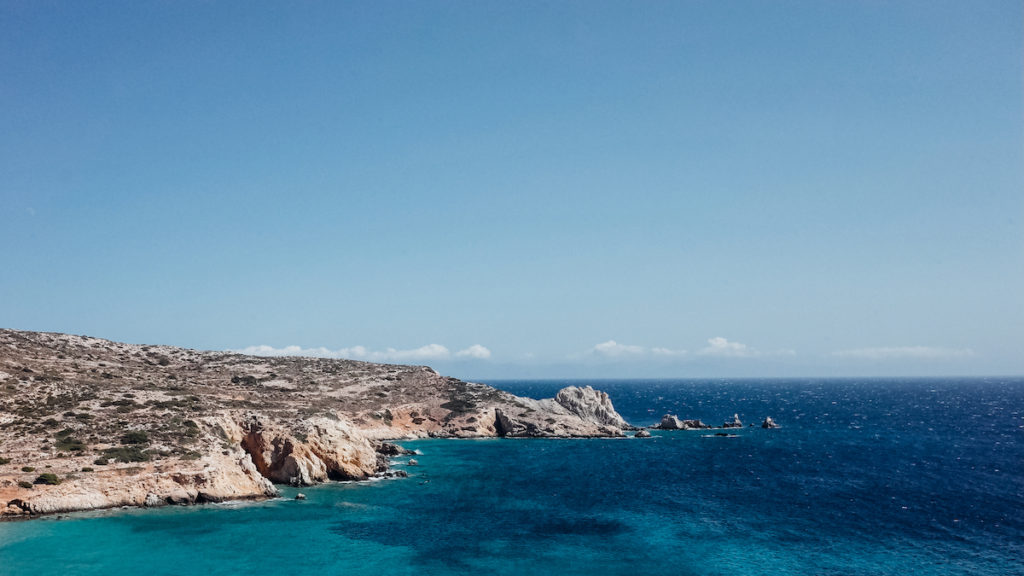
One last time at Livadi Beach and quick dives to see the crystal sea urchins up close. A quick shower in an outdoor bathroom and then straight to the queue at the port. A mask for eight hours, social distancing, and a middle-aged guy in a blue suit running all around the boat trumpeting the measures of the journey.
Now and then, I escape to the deck for a quick smoke. Whatever makes life bearable has been demonized this year. I observe the Italians on the deck as if this is a habit I inherited in Donoussa. Some of them dangle from the handrail and stare at the waves; others pull their masks until the runner in the blue suit excommunicates them, and some nibble cheese pies. Without knowing it, they have brought a drama and an image with them: how a lethal virus decimated their cities and how they got back to the joy of life. Spontaneous and brave, the Italians save the Greek summer.
Love,
George
More about Donoussa: The ultimate travel guide to Donoussa
Pin it for later
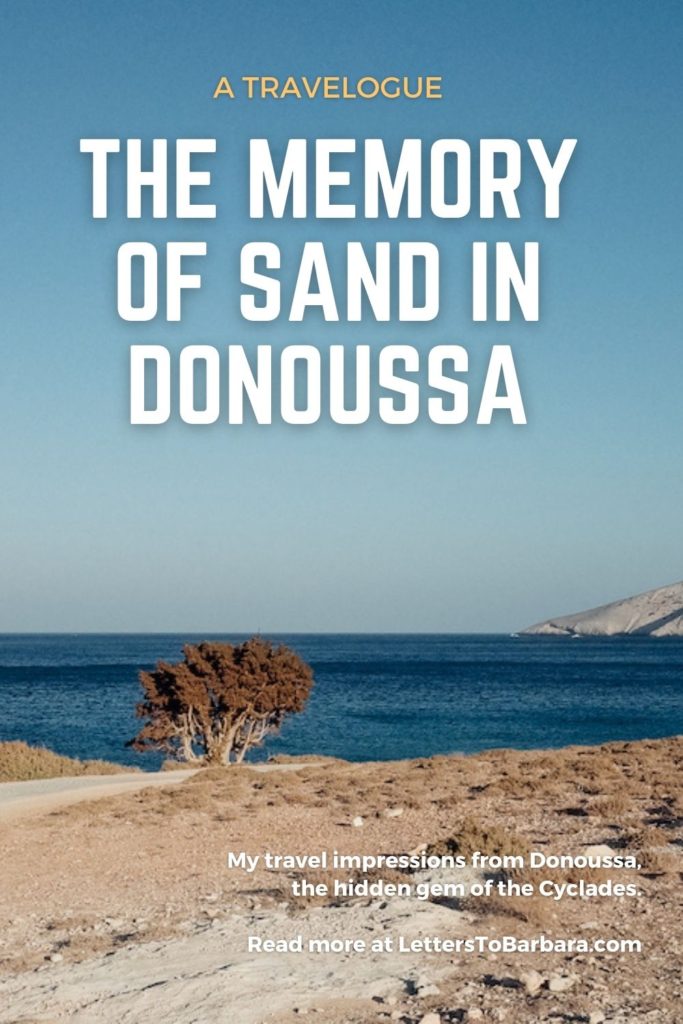
Sharing is caring. Please share The Memory of Sand in Donoussa with your friends.
Last Updated on April 16, 2024 by George Pavlopoulos
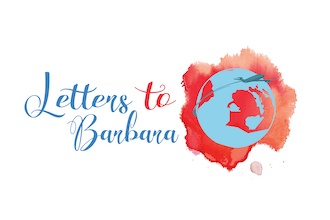
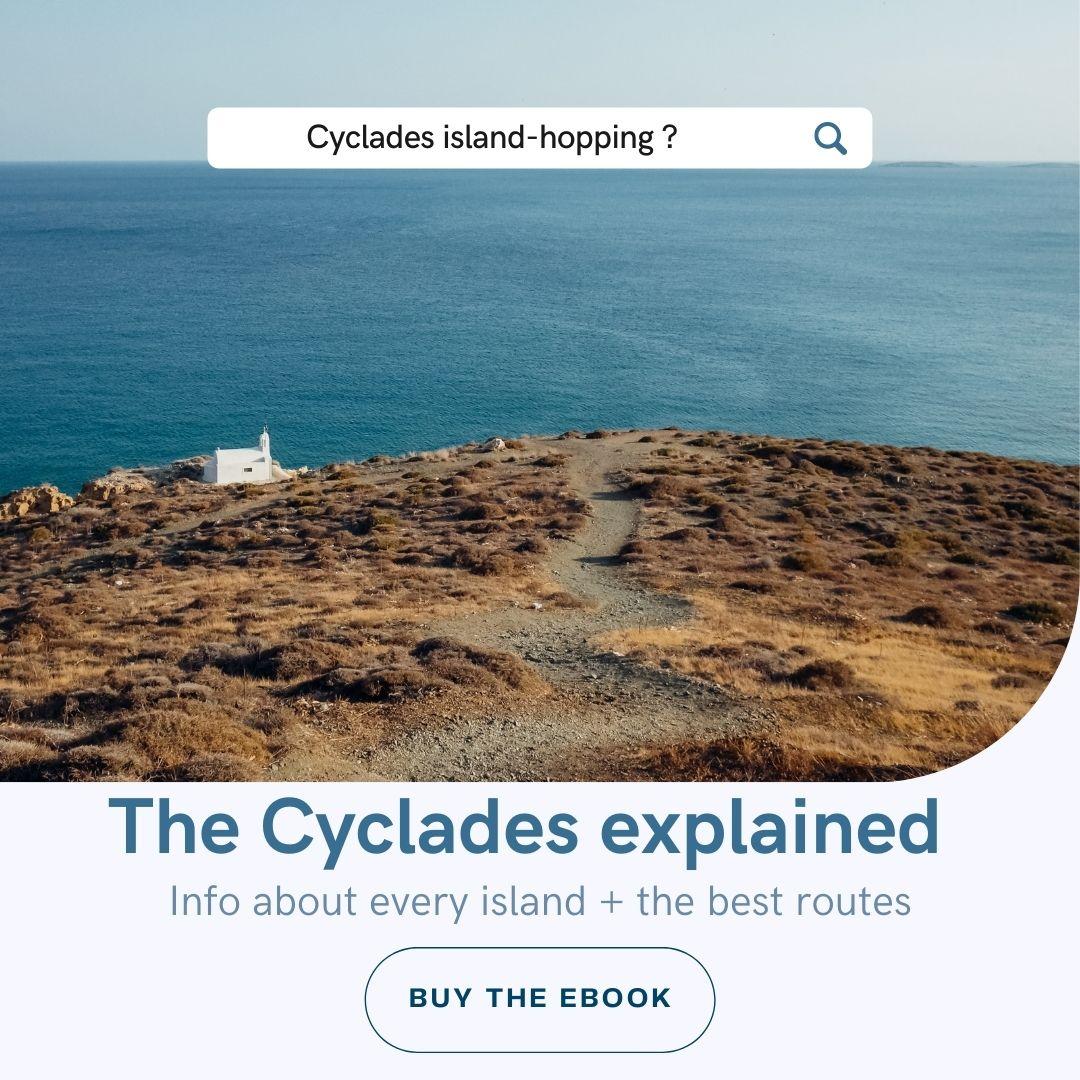

George, this looks like a great island to escape to for some R&R. Sounds like you enjoyed yourself a lot. In Greek mythology, Donoussa is the island where Dionysus, the God of wine, took Ariadne from nearby Naxos. Must be a special place. I wonder have you ever stayed on Naxos? If so what island do you think has the better beaches? What is the best beach in Donoussa? Do you think you can visit Donoussa by going on a day trip from Naxos? Looks like a pretty small island in comparison.
Hey there John,
I’m glad you enjoyed the post. Indeed, Donoussa has a touch of mythology because of Dionysus and Ariadne. The island is really a gem. I have written several times how fond of Anafi I am, but Donoussa made it to my favorite islands list this summer. Within the next couple of weeks, I will upload a very detailed travel guide to Donoussa, but I’m going to answer your questions here as well 🙂
First of all, I have been to Naxos, yes. However, I didn’t stay there overnight: it was usually on my way to another island, and I explored it a little bit while waiting for the next ferry. That said, I can’t say that I have a good overview of Naxos; therefore, it didn’t feel fair to write about it. Hopefully, I will visit Naxos in the future.
I found the beaches of Donoussa to be stunning. In general, I firmly believe that the nicest beaches in the Cyclades are located in the Lesser Cyclades (often mentioned as Small Cyclades, it’s the direct translation from Greek, Μικρές Κυκλάδες). These are Donoussa, Schinoussa, and Koufonisia. I have also been to Schinoussa (there are a couple of posts about it on the blog), but I haven’t been so far to Koufonisia. Schinoussa is stunning as well, but it feels flatter; there’s nothing like the cliffs and landscape of Donousa.
It’s pretty hard to pick the best beach in Donoussa. The reason is, even though the island is tiny, you have a good number of options. I’m not a fan of organized beaches, and, so far, there’s no organized beach in Donoussa. Apart from that, I mainly enjoy beaches off the beaten path, and I enjoy being alone when swimming. From this perspective, I’d say that Trypiti beach at Kalotaritissa is probably my favorite one. It is a nudist beach, but it’s not a problem if you don’t feel like skinny dipping. There’s a beach close to the port, called Kedros, which is usually packed. But the water is crystal clear, and it’s great for swimming. Livadi is probably the most beautiful beach in Donoussa in terms of landscape, but it can be rather crowded.
As for the Naxos-Donoussa itinerary, yes, it is possible to do it. However, I’m not sure if you can do that on a daily excursion. The main reason is the ferry connections; otherwise, it’s really close (I guess something more than one hour). There’s a legendary small ferry called “Skopelitis,” which travels through the Cyclades. I think that it’s much safer to spend a night or two in Donoussa before heading back to Naxos. If you’d like to have a day trip to Donoussa from Naxos, I guess you can ask at Naxos’ port if anybody is offering the route. The chances are that during summertime, there will be some offer for that but be ready to pay some cash.
Indeed, the island is small, but there are quite a few things to do. There are plenty of beaches and a couple of hiking trails. I spent two full weeks in Donoussa, and I wish I could spend another two. The island is fantastic, and you will relax so much that you’ll even consider moving permanently there to live a stress-free life…
Once you experience life in the big city all you want to do is to escape from it and live a simple life on a Greek Island. The dream never dies. Koufonisia has been on my radar for a while now because of the way people rave on about the island’s great beaches. Now I don’t know which island I would visit first because Donoussa sounds as if it could be an even better hideout from all the troubles of the world. Sounds like you found the perfect Greek Island!
So true! I daydream of these island-days all year long. Anafi and Donoussa are definitely on the top of my list. Everybody talks about Koufonisia lately; there’s a lot of hype, and in August, it’s packed, I think. Nonetheless, it’s indeed a beautiful place, and I’d love to visit it too, but most likely offseason. I think you will love Donoussa -the landscape is stunning.
Hypnotic 🙂
Thank you so much, Valentina. I’m glad you enjoyed it. I think Donoussa is one of these islands that everybody will love -I can only recommend it 🙂
Hi George,
Thank you for your nice and subtle travelreport of Donoussa.
For me your writings keeps me realy in emotional contact with my beloved greek islands. This year, because of corona I decided to stay at home ( The Netherlands) so I missed Greece a lot.
In 2019 I stayed for one night in Donoussa . We (my brother and two friends) visisted the bay of Kalotaritissa with a yacht. At that moment knew I would come back again.
That’s s why I ‘m looking forwarth to your planned next writing about Donoussa.
Greetings Frank
Hello dear Frank,
I’m so glad to see you here. Thank you for your kind words. Since you have already been to Donoussa, you know already how beautiful the island is. It was my first time in Donoussa, and I was really impressed, even though I have traveled extensively to the Greek islands. The mood was a bit bizarre at times due to the situation, but I enjoyed the island very much. Kalotaritissa is really beautiful, and the small bays make it even more special.
I truly hope that you can visit Donoussa (and your beloved Greek islands!) next year. Let’s hope that this horrible virus will be (somehow) tamed next year, although I believe that some regulations will accompany us for a long time.
Stay healthy, Frank, and all the best for the tough winter ahead. I planned to travel to the Netherlands this year, but everything got canceled. Let’s hope for better days.
Take care,
George
Hi George,
I just stubled across your blog and read a few articles on places I’ve been and places I’ll visit in September. This entry cought me most as it transports the tranquil late summer melancholy of the Mediterranian beautifully.
I’ve been to Donousa in September 2021 and many of your observations evoke memories or at least leave the feeling of a memory. I truly loved the quietness of Donousa, clocks were running at a slower pace and I stared at the sea for hours. After Donousa I went to Koufonisi, fantastic beaches, but mucht more of a party vibe despite some end of season closings. The latter is also great, but Donousa does not let me go anymore. Thus, I will be returning in approx. 4 weeks. Unfortunately only for 4 nights, as I want to discover other islands (Amorgos and Antiparos) as well, but the island somehow called me – which reminds me of a 50ies song from the musical South Pacific.
Maybe you’ll find it amunsing, so here are the lyrics (just imagine Donousa instead of the fictional island of Bali Hai):
“Bali Ha’i may call you
Any night, any day
In your heart you’ll hear it call you
Come away, come away
Bali Ha’i will whisper on the wind of the sea
Here am I, your special island
Come to me, come to me”
Anyhow, I actually never commented on a blog before – or at least I don’t recall it. But the beautiful storytelling got tome and I just wanted to show my appreciation.
Greeetings from Frankfurt
Dany
Dear Dany,
What a wonderful comment that was! I am so happy that you stopped by, read, and comment! It’s so nice to hear you loved Donoussa as much as I did/do. And thank you also for sharing the song: I must admit, I didn’t know it, but I found it on YouTube and loved it.
Amorgos and Antiparos won’t let you down for sure. They might not feel as quiet and introspective as Donoussa, but they definitely have charm and beauty. There’s also a travelogue from Amorgos on the blog and a guide to the island if that helps you with your travel plans. To Antiparos, I’ve only been in a pre-blogging and actually pre-digital long-gone era. I suspect it changed a lot since then.
As you read in the travelogue, I visited Donoussa in the first pandemic summer, which made the whole experience even more noteworthy. Donousa is always a place that I daydream of returning. Friends from Germany are visiting later in the summer the island, and I’m looking forward to their impressions. Apparently, I’m also looking forward to your impressions, so feel free to pop by with some fresh Donousa thoughts.
I hope Frankfurt is still sunny -we all need sunshine in August. It’s a beautiful and misconceived city; I was there briefly in late May.
Thanks again for commenting -and I’m glad this Donoussa travelogue made you comment on a blog for the first time.
Enjoy Donoussa and the Greek islands, Dany!
Best regards,
George